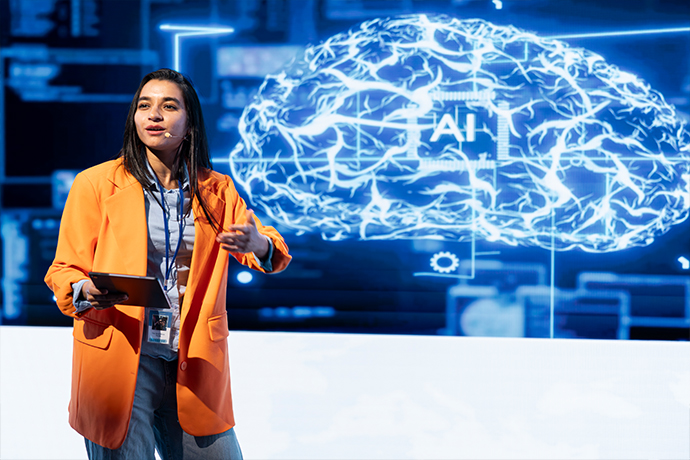 SPEAKERS
SPEAKERS
 TOPICS
TOPICS
AI is everywhere, and it has both positive and negative impacts on humans. However, a key question is, can AI affect our mental health? Join us as we explore the answer to this question.

As more organizations adopt AI tools across their functions to improve productivity and efficiency, experts are analyzing the negative effects of AI on employees’ mental health. Knowing the impact of using AI will help organizations make an informed decision about its adoption rate. More importantly, it can help decision-makers to better comprehend AI effect on mental health before implementing it.
In this article, we will focus on AI and psychology, with a specific emphasis on how it can affect employees’ well-being and productivity.
AI has a multifaceted impact on psychology. Research shows that this impact is both positive and negative and can be divided into the following broad areas:
With technological advancements, the impact will be broader, covering more areas and also going more in-depth into each of the above areas.
In the workplace, too, the use of AI tools can provide many advantages, like:
Due to these advantages, most organizations worldwide are embracing AI in their workflows. At the same time, many researchers are examining the AI effect on mental health.

The AI effects on humans are interesting, as they provide an in-depth understanding of how human brains work and what motivates them. While there many many benefits, employers must also consider the following downsides before introducing AI into their workplace.
As humans, we are resistant to change, especially when we perceive the change as a threat to our existence. AI is no different. Many employees, and in particular, the older employees, may see AI as a threat to their jobs. As a result, they are likely to resist its introduction.
In some cases, it may even increase their stress and anxiety, leading to serious mental health issues.
Another potential impact is job burnout. Though the common perception is that AI will improve the productivity of workers and help them get a better work-life balance, the downside is that it can come with a steep learning curve.
In other words, employees will have to learn new AI tools and languages to adapt to the use of AI within their organization. This requirement can add to their workloads. As a result, employees will have to put in extra hours to learn the new technology on top of their regular responsibilities.
Such high workloads may not be for everyone, especially those with responsibilities at home. Eventually, more time and effort can lead to job burnout.
AI can bring about changes in team dynamics. Often, the younger generations, who are most adept at digital tools, can learn quicker than the older generations. These differences may cause ego clashes at work and possible changes to the existing workplace dynamics.
As we embrace AI more and more in our lives, there’s a high chance that it can lead to high dependency. We may get to a point where we cannot work without AI tools. This dependency poses a problem because the sudden non-availability of AI tools or changes in the vendor’s company or features can profoundly impact an employee’s ability to work. Also, it can cause high anxiety when these tools are unavailable, even for a brief time.
As you can see, there are many direct and indirect negative effects of AI on mental health. It’s important for employers to understand these effects and take steps to help employees smoothly transition into an AI-based workplace.

Understanding the AI effects on humans is the first step to creating support programs for helping employees embrace AI in their worklives. Below are some tips that employers can implement to improve the mental health of their employees.
With the above strategies, you can reduce the negative effects of AI on your employees. More importantly, you can help them embrace AI and leverage the benefits that come with it.
To conclude, AI is here, and it is impacting our personal and professional lives. While there are many benefits of adopting AI at work, there are also direct and indirect downsides that come with it.
Employers must understand these downsides and provide the appropriate support needed to help employees accept AI in their work. The above-mentioned strategies, like setting realistic expectations, offering training, creating an open culture, etc, can alleviate these negative effects.
One of the proven ways is to encourage human connection by inviting experienced mental health speakers and AI speakers to talk about AI effect on mental health, and how employees can cope with the stress and anxiety that comes with it.